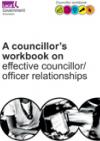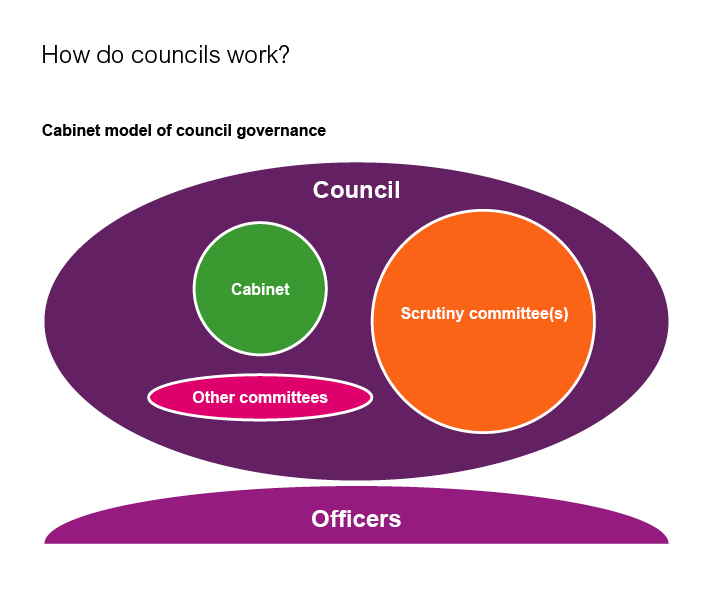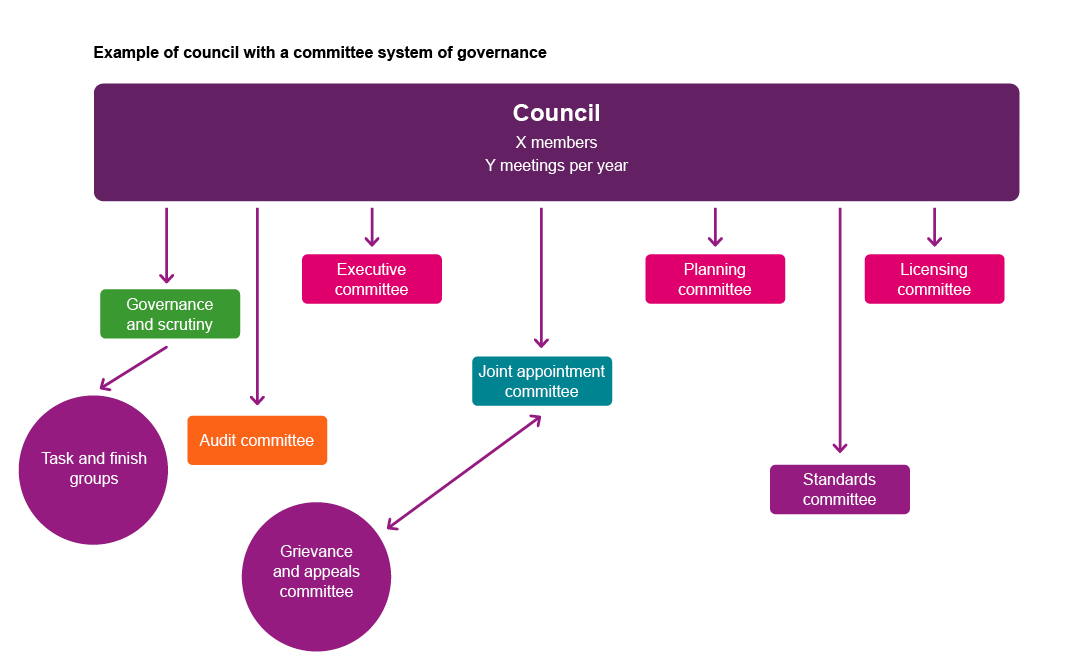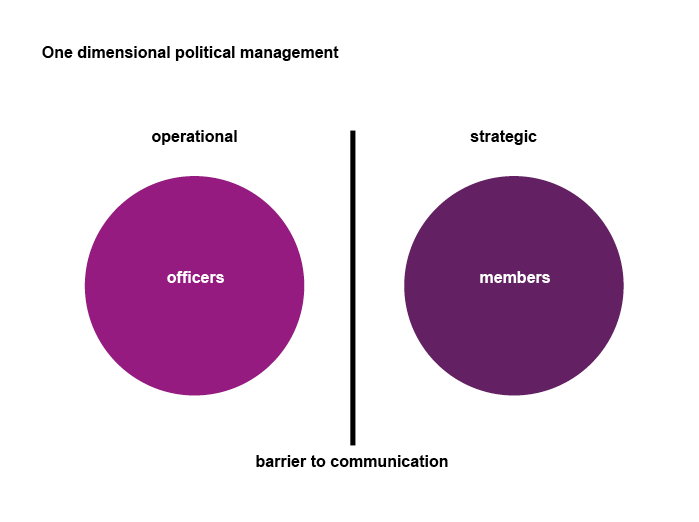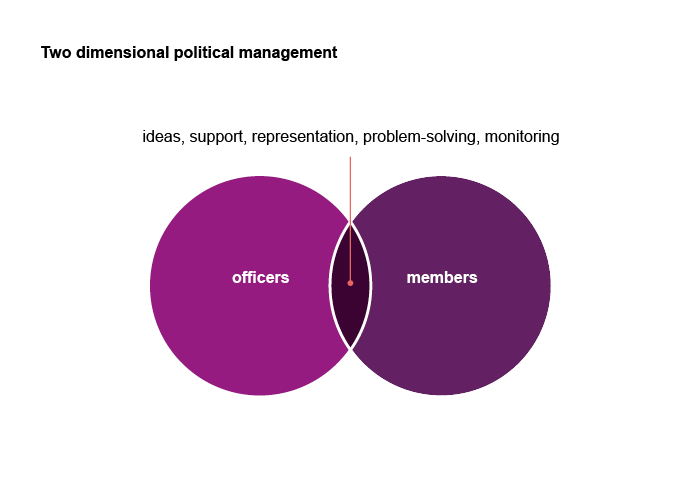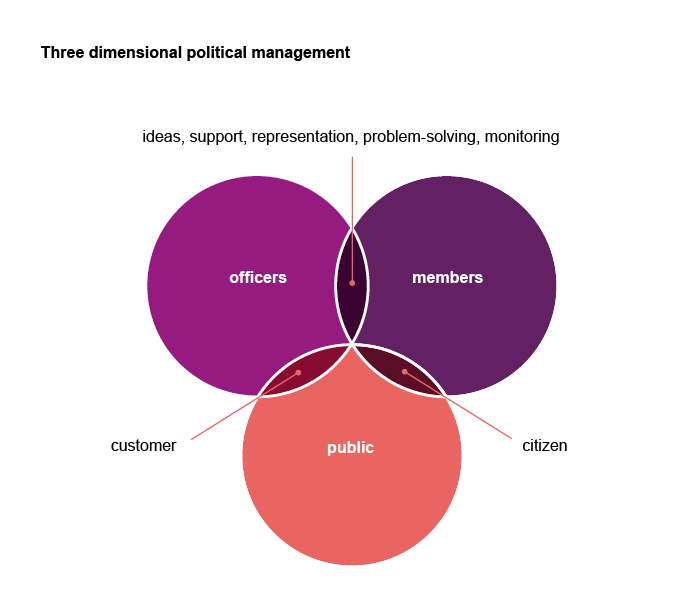The Local Government Act 2000 sets out the governance models that must be operated by local authorities. These are:
- a mayor and cabinet executive
- a leader and cabinet executive
- the committee system
- other arrangements approved by the Secretary of State.
However, whatever these arrangements are in your council, in simple terms:
Councillors provide the democratic leadership of the council. They:
- represent members of the public
- provide leadership and direction to the council
- scrutinise service delivery.
Officers are employees of the council. They:
- implement the policies agreed by councillors
- organise and deliver services
- provide unbiased, professional advice and support to councillors.
Guidance
“Effective councillor/officer relations depend upon trust and clear and honest communication in both directions. You certainly don’t need to be friends. What you do need is to respect and understand your distinct roles. Consider officers’ positions and their competing priorities and restrictions. This can avoid potential frustration or confusion about what might otherwise be perceived as obstructiveness. If officers don’t appreciate your role as a councillor, then it’s better to address it than to try to work around it because it will cause problems down the line.
Councillors and officers have a collective corporate responsibility. But aspects of their roles are distinctly different. Research has shown that the greater the degree of openness and understanding about this, the better the working relationship. Most councils attempt to provide this clarity through joint working protocols, anchored in the Constitution. And through embedding a code of conduct, adhered to by all councillors to provide a framework for effective working and for undertaking their elected member role in accordance with the Seven Principles of Public Life, also known as the Nolan Principles.
There are growing concerns about the impact an increasing level of public intimidation and toxicity of debate is having on our country’s democratic processes, particularly at a local level the The intimidation and abuse of councillors, in person or otherwise, undermines democracy; it can prevent elected members from representing the communities they serve, prevent individuals from standing for election and undermine public trust in democratic processes.
In response, the LGA is works closely with WLGA, COSLA and NILGA to coordinate a programme of work entitled ‘Civility in public life’, primarily aimed at:
- articulating good standards for anyone engaging in public and political discourse,
- understanding the scale and impact of intimidation and abusive behaviour on our membership organisations, and develop recommendations for achieving positive debate and public decision-making on a local level
- to support our members and all democratically elected local representatives in addressing intimidation and abuse, so they deliver the best on behalf of their communities
You can read more about this programme of work in our Civility in public life programme report and access our various guides for councillors and officers.
Councillor conduct and standards
The role of councillor is a vital part of local democracy; it therefore key that councillors are held account accountable and to high standards while fulfilling their role. To support councillors to maintain these high standards the LGA has produces various resources, which can help councillors understand the requirements associated with their role.
The primary means for maintaining standards of conduct and behaviour is the Councillor Code of Conduct, which all councils are required to have. In association with key partners and extensive consultation with the sector, the LGA has developed a Model Councillor Code of Conduct and supportive guidance for councillors and monitoring officers conducting code of conduct complaint investigations.
LGA training
The LGA has produced various resources to support councils and councillors to maintain high standards of conduct and behaviour in public life.
The most effective councillors gain a good appreciation of:
- the distinct contribution that councillors and officers make in the running of the council and the boundaries between them, eg officers must act with political impartiality, serving the whole council rather than particular groups or councillors
- the areas in which roles and responsibilities overlap and councillors and officers must act together to provide democratic governance.
Quick guide
| Councillors |
Officers |
| Accountable to the electorate |
Accountable to the council |
| Community leader for a ward |
Serve the whole council |
| Add a political dimension |
Politically impartial |
| Set high level policy/strategy |
Ensure operational delivery |
| Involved in senior appointments |
Day to day staff management |
In reality, there are few truly distinct roles and it is increasingly common for the leadership of local authorities to be defined by the close pairing of politicians and officers, who come together with the local community to tackle the challenges presented by the communities they serve. This is not about a separation of duties but an understanding of the skills, knowledge and experience that both bring to the leadership role.
Councillors provide strategic direction and officers are responsible for the management of the council and ensuring the implementation of agreed policies. But the evolving relationship between councillors and officers, and the ways in which they can intersect can be summarised in the diagrams below.
One dimensional political management
If councillors and officers work in isolation, and there is little or no communication between them, it is easy to see how strategic direction and delivery become disconnected. This would have a detrimental effect on services and make it difficult to provide the community with clear communication about priorities.
Two dimensional political management
Where these two spheres come together and overlap, there is effective dialogue in a shared space and the opportunity for ideas, support, problem solving and monitoring of progress can take place effectively. This join up between councillors and officers enables communities to understand the political decisions made and how they will be implemented. While councillors and officers may have their own specific roles and responsibilities, there are some grey areas in which both groups have a shared responsibility, eg agreeing workable policies and monitoring performance.
Three dimensional political management
However effective relationships between officers and councillors also involve a vital third dimension – that of the local community. Members of your local community are both citizens with rights and responsibilities and customers of the council. Where these three roles intersect in the centre of this diagram is where consultation and discussions take place about the way forward, and although not everyone will be happy with the outcome, they will understand the political, professional and public perspectives on the issue.
If we take the example of relocating a fire station, we may consider that this is an officer decision as it will be based on evidence about number of incidents and using resources effectively. However, councillors will have a very clear view on the issue as it will directly affect political priorities and their reputation in the community. We may also recognise that the public will have a view on this as they may perceive this presents a new level of risk. Starting these discussions within the officer space, moving them into the shared space with councillors and overlaying the public dimension illustrates how these boundaries are fluid and issues can move in and out of different spaces.
Like any business relationship, mutual trust and respect are essential in setting the right tone for effective working relationships between councillors and officers.
Key issues to consider are:
- Knowing how to debate, decide and act in a joint way, taking into account both the political and managerial priorities and realities. In order for this to work appropriately, politicians and managers need to sit down as equals and act jointly as a result.
- The challenges that this working arrangement can bring and where tensions may arise. Particularly where there are other political relationships such as overview and scrutiny; and in councils where there is no overall majority. These situations make it even more important to establish strong and productive working relationships.
Challenge 1 – jointly tackling the challenges of your community
Imagine your council has a new, high profile, project to increase community awareness and involvement in a campaign to tackle anti-social behaviour. This is in response to an increase in complaints from residents about noise late at night, groups of young people congregating and drinking, cars being driven erratically and other visible damage, eg vandalism, litter dropping and spray graffiti on walls. Other partners, most notably local schools and the local chief constable, have also reported their concerns, asking the council to collaborate in identifying what action can be taken.
(1) Identify a list of ten key steps the council may wish to consider in addressing the situation described, including those which could be undertaken on a collaborative basis with other agencies.
(2) Having identified the ten key steps, consider whether each should be tackled by councillors (C), officers (O), or jointly by councillors and officers (J).
Reflect on your answers. It should be clear that most of the steps you have identified could be undertaken by either councillors or officers, although it is likely that there is more to be gained from using the skills, knowledge and experience of both.

